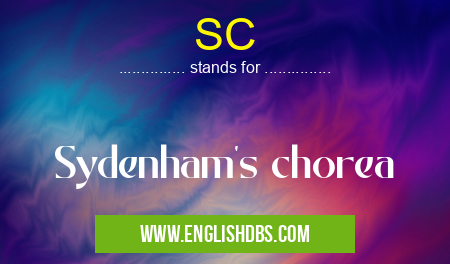What does SC mean in SYNDROMES
SC is a medical abbreviation that stands for Sydenham's chorea. It is a neurological disorder characterized by involuntary writhing movements, particularly of the face, trunk, and limbs.

SC meaning in Syndromes in Medical
SC mostly used in an acronym Syndromes in Category Medical that means Sydenham's chorea
Shorthand: SC,
Full Form: Sydenham's chorea
For more information of "Sydenham's chorea", see the section below.
Causes
SC is caused by a bacterial infection, usually Streptococcus pyogenes (group A streptococcus), which triggers an autoimmune response in the brain. This response damages the basal ganglia, a group of structures in the brain that help control movement.
Symptoms
The main symptom of SC is involuntary writhing movements that can affect different parts of the body, including:
- Face (grimacing, tongue protrusion)
- Trunk (jerking, twisting)
- Limbs (flailing, kicking)
Other symptoms may include:
- Emotional lability
- Speech difficulties
- Difficulty swallowing
- Fatigue
- Weakness
Diagnosis
The diagnosis of SC is based on a combination of:
- Medical history (recent streptococcal infection)
- Physical examination (involuntary movements)
- Blood tests (elevated anti-streptolysin O titer)
- Imaging studies (MRI or CT scan) to rule out other causes
Treatment
Treatment for SC typically involves:
- Antibiotics to eliminate the underlying bacterial infection
- Medications to control involuntary movements (e.g., haloperidol, valproic acid)
- Physical therapy to improve coordination and strength
- Speech therapy to address speech difficulties
Essential Questions and Answers on Sydenham's chorea in "MEDICAL»SYNDROMES"
What is Sydenham's chorea (SC)?
SC is a neurological disorder that affects children and is characterized by involuntary, purposeless movements called chorea. It is often associated with rheumatic fever, an inflammatory condition that can occur after a streptococcal infection.
What causes SC?
The exact cause of SC is unknown, but it is thought to involve an autoimmune reaction in which the body's immune system attacks the brain. This autoimmune response is triggered by the presence of antibodies produced in response to a recent streptococcal infection.
What are the symptoms of SC?
The primary symptom of SC is chorea, which can affect different parts of the body, including the face, limbs, trunk, and vocal cords. Other symptoms may include irritability, emotional lability, fatigue, and weakness.
How is SC diagnosed?
SC is diagnosed based on a physical examination and the patient's medical history. A doctor may also order blood tests to check for evidence of a recent streptococcal infection or an autoimmune disorder.
How is SC treated?
Treatment for SC focuses on managing the symptoms and preventing further damage to the brain. Medications such as antipsychotics and mood stabilizers can help control the chorea and other behavioral symptoms. Antibiotics may also be prescribed to treat any underlying streptococcal infection.
What is the prognosis for SC?
The prognosis for SC is generally good. Symptoms typically resolve within a few months to a year, although in some cases, they may persist for longer. Treatment can help improve the outcome and prevent complications.
Final Words: Sydenham's chorea (SC) is a neurological disorder characterized by involuntary writhing movements caused by a streptococcal infection. Early diagnosis and treatment are essential to minimize symptoms and prevent long-term complications.
SC also stands for: |
|
| All stands for SC |
